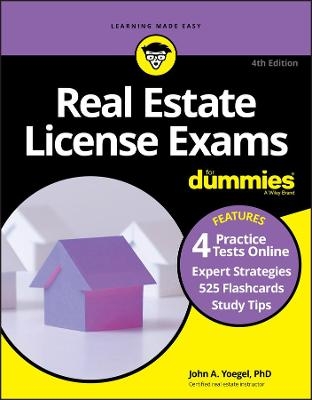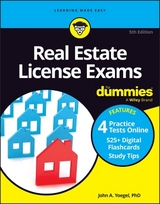
Real Estate License Exams For Dummies with Online Practice Tests
For Dummies (Verlag)
978-1-119-72485-8 (ISBN)
To get your foot in the door of the competitive real-estate trade, your first port of call is passing your state exam. Real Estate License Exams For Dummies gives you the building blocks to help you succeed in order to get moving in this lucrative career. It'll guide you through the latest information on contracts, deeds, appraisals, leasing, and mortgage types—plus four complete practice tests to make sure you know your way around the real thing.
Written in a friendly, step-by-step style by expert instructor John A. Yoegel, it offers proven test-taking strategies and study techniques that will help you negotiate the big day and have you signing on the dotted line to make that first big sale in no time!
Take 4 complete practice tests with answers
Access real estate laws for all 50 states
Get grounded in real estate terminology
Study on-the-go with flashcards
If you want to move quickly into your dream career, there's really no better key than this trusted, bestselling guide!
John A. Yoegel, PhD, is a certified real estate instructor and former board member of the Real Estate Educators Association. He teaches pre-licensing and continuing education courses for salespeople, brokers, and appraisers.
Introduction 1
About This Book 1
Foolish Assumptions 3
Icons Used in This Book 3
Beyond This Book 4
Where to Go from Here 5
Part 1: Putting Real Estate License Exams into Perspective 7
Chapter 1: Sold! Taking a Glance at Real Estate License Exams 9
Checking Out Licensing and Exam Basics 9
Figuring out licensing procedures 10
Knowing the difference between salesperson and broker licensing and exams 10
Looking at the format and other exam details 12
Sign Me Up: Registering for the Exam 12
Knowing What to Take to the Exam and What to Leave at Home 13
Scoring High: Figuring Out How Scores Are Determined 14
Take Two: Retaking the Exam 15
Chapter 2: Using Successful Study and Test-Taking Techniques 17
One Word to Get You Through: PREPARE 17
Provide 18
Review 18
Evaluate 19
Practice 20
Arrive 20
Relax 21
Enjoy 21
Trying Terrific Test-Taking Strategies 21
It’s all in the timing 21
Reading everything carefully 22
Avoiding too much analyzing 23
Guessing 23
Second-guessing 24
Number crunching: Tackling math questions 24
Part 2: So You Want to Sell Real Estate: The Job and Basic Laws 25
Chapter 3: The Job: It Isn’t Just Driving People Around 27
Recognizing Those in the Real Estate Business and How They Got There 28
The buck stops here: Brokers 28
Movin’ on up: Salespeople 29
In between: Associate brokers 29
Making it legal: Looking at license law 29
Knowing What a Real Estate Broker/Salesperson Does 30
Perusing a list of common activities 30
Checking out a typical real estate transaction 30
Understanding How a Real Estate Broker/Salesperson Gets Paid 32
Working Hard: Career Opportunities 33
Considering independent brokerages and national franchises 33
Checking out corporations (in and out of the real estate world) 34
Building business with builders 34
Going into government 34
Appreciating appraising 35
Homing in on home inspections 35
Property Management: A Special Kind of Career Opportunity 35
Taking care of business: The duties of a property manager 35
Saying yes: The property management agreement 38
Managing a Real Estate Office: You’re the Boss, Ms or Mr Broker 39
Keeping an eye out: Supervision 39
Teach me! Training 40
Setting office policy: Rules are rules 40
Working As an Independent Contractor 40
Focusing on Job-Related Laws That You Need to Understand 41
The price isn’t right: Price fixing 41
Bad break: Market allocation 41
Feeling shunned: Group boycotts 42
What’s your condition? Tie-in arrangements 42
Review Questions and Answers 42
Chapter 4: Understanding Agency Law 45
Becoming Someone’s Real Estate Agent: You’re Hired 46
Picking sides: Representation in agency relationships 46
Establishing the agency relationship (and doing it in writing) 49
Keeping the Faith: The Relationship between an Agent and a Principal 52
Who has the money? Accounting 53
Better be careful: Care 53
Shhhhh! It’s a secret: Confidentiality 53
You’d better tell: Disclosure 53
A friend to the end: Loyalty 54
Yes ma’am: Obedience 54
Meeting Obligations: The Relationship Between an Agent and a Customer 55
Discovering defects 55
Looking at stigmatized properties 56
Respecting Megan’s Law 56
Finding out about fraud and negligent misrepresentation 56
Making Money (No, Not at the Copy Machine) 57
Pay up! Deciding who needs to pay an agent 57
Ready to go: Knowing when an agent should be paid 58
Parting Is Such Sweet Sorrow: Ending an Agency Relationship 59
Review Questions and Answers 60
Chapter 5: Knowing the Fair Housing Laws for Selling Real Estate 63
Practicing Fair Housing: The Basics 63
Understanding federal fair housing laws 64
Researching state and local laws 65
Displaying the fair housing poster 65
Don’t Do It: Avoiding Discriminatory Actions 65
No way: Refusing to sell or rent 66
On one condition… or a few: Changing terms for rental, sale, or services 66
You need not apply: Discriminatory advertising 66
All lies: Telling someone that property isn’t available (when it really is) 68
Scaring people into selling: Blockbusting 68
Telling people where to live: Steering 68
No money for you: Changing loan conditions 68
Put away that crayon: Redlining 69
You can’t join: Denying membership in real estate organizations 69
Feeling Safe: Identifying Who’s Protected 69
Knowing the federal protected classes 69
Recognizing state and local protected classes 70
Bending the Rules: Understanding Exceptions to the Law 70
Extra Coverage: Protecting the Disabled from Discrimination 72
Staying Strong: Enforcing the Law 72
Review Questions and Answers 73
Part 3: It’s All Mine: Owning and Transferring Real Estate 77
Chapter 6: Owning It: Estates and Interests 79
What Do You Own? Understanding Ownership Terms 79
Looking at land 80
Recognizing real estate 80
Defining real property 80
Checking out personal property 80
Estates (Even Without the Castles) 81
Pick and choose: The bundle of rights 82
Figuring out freehold estates 82
Understanding leasehold estates 84
Eyeing Different Ownership Rights 84
Going for a swim: Water rights 84
Don’t forget to look up and down: Other rights 85
Review Questions and Answers 86
Chapter 7: Understanding Forms of Real Estate Ownership 89
Real Estate Ownership: A Solo or Group Activity 89
One is the loneliest number: Owning real estate by yourself 90
Join the crowd: Owning real estate with other people 90
Getting hitched: Owning real estate when you’re married 91
Who do you trust? Ownership in trust 92
All business: Ownership by a business 92
Special Types of Ownership: Cooperatives, Condominiums, and More 94
Share and share alike: Cooperative ownership 94
More individuality: Condominium ownership 95
Mix it up: Planned unit developments 96
Check your watch: Time shares 96
Review Questions and Answers 96
Chapter 8: Knowing the Limitations on Real Estate Ownership 99
Carrying a Not-So-Heavy Encumbrance: Private Limitations on Property Use 99
Looking at liens 100
Easing into easements 102
It won’t let you drive, but it’s still a license 105
No, you can’t paint your house purple: Deed restrictions 105
I thought I owned it: Encroachments and adverse possession 107
Land-Use Regulation: A Major Public Limitation 107
To the drawing board: Making master plans 108
You’re in the zone: Understanding zoning ordinances 108
Many from one: Subdivisions 110
Building a house out of paper: Regulations for construction 112
Getting that house built 112
The Government Has Its Say: Other Public Limitations on Property Use 113
The city wants to build a library: Eminent domain 114
You didn’t know the government was part of your family: Escheat 115
Pay or lose: Taxation 115
Review Questions and Answers 115
Chapter 9: Transferring Ownership: Deeds and Title Closing 119
Doing the Deed: Delving into Deed Basics 120
Making it right: Requirements for a valid deed 120
The deeds of the many: Examining various kinds of deeds 122
Painting the right picture: Property descriptions in deeds 124
Getting Closure: Title Closing 131
Nearing the finish line: Before the closing 131
The big day: At the closing 133
A little paperwork: After the closing 137
Review Questions and Answers 139
Chapter 10: Giving Up or Losing Property 143
Fine by Me: Giving Up Property Voluntarily 143
All for the government: Dedication 143
From me to you: Gifts 144
A treat from Uncle Sam: Public grants 144
The usual way: Sales 144
By Force: Losing Property Involuntarily 144
It’s really mine: Adverse possession 145
You can’t fight nature: Avulsion and erosion 146
We need that, please: Eminent domain 146
Deep in debt: Foreclosures 146
Ignoring the rules: Forfeiture 146
Making the split: Partitioning 146
Losing Property Very Involuntarily: Passing Title After Passing Away 147
Where there’s a will, there are heirs and relatives 147
Where there’s no will, there still may be heirs and relatives: Laws of descent 147
The court has its say: Probate 148
Review Questions and Answers 148
Part 4: A House Is Made of Lots of Paper: Legal and Physical Issues 151
Chapter 11: Contracts 101 153
Agreeing to Do Something: The Basics of Making a Contract 153
Exploring how a contract is created 154
What makes a contract valid? 155
So Many Choices: Examining Types of Real Estate Contracts 156
Finding out about agency agreements 157
Examining sales contracts 158
Discovering options 160
Looking at land contracts 160
Checking out leases 161
The End of the Line: Discharging a Contract 161
Breaching a Real Estate Contract 162
When the buyer refuses to go ahead with the contract 162
When the seller refuses to go ahead with the contract 163
Review Questions and Answers 163
Chapter 12: Leasing Property 167
Identifying Who’s Who and What’s What 167
Owning property: Leased fee estates 167
Renting property: Leasehold estates 168
The Usual Suspects: Preparing a Typical Lease 169
Looking at laws governing leases 169
Examining typical provisions of a lease 169
Distinguishing among Various Types of Leases 171
Gross lease 171
Ground or land lease 171
Lease for oil or gas rights 171
Net lease 172
Percentage lease 172
Proprietary lease 172
Variable lease 172
Breaking a Lease: Types of Eviction 172
Getting What You Paid For 173
Nonresidential building layouts 173
Adding on and taking away 173
Review Questions and Answers 174
Chapter 13: Dealing with Environmental Government Regulations and Issues 177
Deciphering the Federal Government Alphabet Soup 178
CERCLA 178
EPA 178
HMTA 179
HUD 179
LUST (It’s not what you think) 179
OSHA 179
SARA 179
SDWA 180
Assessing the Environmental Effects of Building Developments 180
Making a statement: Environmental impact statements 180
Having suspicions: Environmental assessments 181
This Stuff Can Make You Sick: Examining Environmental Pollutants and Situations 181
Asbestos 182
Brownfields 182
Building-related illness 182
Electromagnetic fields 182
Lead 182
Radon 183
Sick building syndrome 183
Solid waste (radioactive and otherwise) 184
Underground tanks 184
A few more quick definitions to keep in mind 184
Go with the Flow: Water and Waste Issues 185
Water pollution 185
Sanitary waste disposal 186
Storm water disposal 186
Review Questions and Answers 186
Part 5: You Want How Much? Valuation and Financing of Real Estate 189
Chapter 14: Appraising Property 191
Figuring Out Appraisal Basics 191
Knowing what an appraisal is 191
Seeking an appraisal: Why you need one 192
Understanding the Importance of Location! 194
You can’t move it 194
You’re not on Gilligan’s Island 194
You can’t make any more of it 195
Arriving at Different Types of Value 195
Going to market value, that is 195
Value in use 196
Investment value 196
Assessed value 196
Creating, Changing, and Affecting Values: Some Economic Factors 196
Anticipation 197
Balance 197
Change 197
Competition 197
Conformity 197
Contribution 197
Externalities 198
Highest and best use 198
Increasing and decreasing returns 198
Opportunity cost 198
Plottage 199
Regression and progression 199
Substitution 199
Supply and demand 199
Surplus productivity 199
Finding Value by Analyzing Comparable Sales 199
Understanding the basics 200
Adjusting the sales price 200
It isn’t old, it’s mature: Making age adjustments 201
Having time to adjust for time 201
Figuring adjustment values 202
Finding Value by Analyzing Replacement Cost and Depreciation 202
A journey begins with the first step or a formula 203
Estimating replacement and reproduction costs 203
Estimating depreciation 204
Dirt costs money, too: Estimating land value 206
Finding Value by Analyzing a Property’s Income 207
Grossing out the rent 207
Capitalizing the income 208
Reconciling a Property’s Value 211
Review Questions and Answers 212
Chapter 15: Finding the Money: Mortgages 215
The Way Things Work: Mortgage Basics 215
The nuts and bolts of the mortgage process 216
Liens, notes, and a mistake most people make 216
I have a theory…on mortgage loans 217
Common conditions of a mortgage loan 218
Examining Sources of (and Insurance for) Funding 220
Number one: The primary mortgage market 221
Number two: The secondary mortgage market 221
See your uncle…Sam, that is: Federal loan insurance programs 223
A private matter: Private mortgage insurance 224
Considerations for Lenders Accepting Mortgages 225
Checking out the property value 225
Examining the borrower’s ability to pay 226
Grasping the Different Types of Mortgages 227
Blanket mortgage 227
Construction loan 227
Home equity loan 227
Open mortgage 227
Open-end mortgage 228
Package mortgage 228
Purchase money mortgage 228
Reverse mortgage 228
Sale leaseback 228
Shared equity mortgage 229
Temporary loan 229
Wraparound mortgage 229
Comprehending Mortgage Repayment Plans 229
It’s in your interest: Fixed and adjustable rates 230
Doing the math: Amortized loan 231
On the straight and narrow: Straight loan 233
A good mix: Partially amortized loan 234
Fast times: Growing equity mortgage 234
Endings You Didn’t Anticipate: Foreclosures, Assumptions, and Assignments 234
Shut down: Foreclosures 234
Who owes whom? Assumption and assignment 235
Being Fair: Consumer Protection Laws 236
The Community Reinvestment Act 237
The Equal Credit Opportunity Act 237
The National Affordable Housing Act 237
The Truth in Lending Act 237
Review Questions and Answers 238
Chapter 16: It’s So Taxing: Real Estate Assessment and Taxes 241
Who Wants Your Money, and What Do They Want with It? Collecting Taxes 241
Recognizing What’s So Special about Assessments 242
Go Figure! Calculating Taxes Step by Step 242
Oh so valuable: Assessing property for taxes 243
The numbers game: Understanding tax rates 244
Doing the decimal diddle: Calculating the taxes due 245
A nice balance: Using equalization rates 246
Home Free (Sort of): Eyeing Property Tax Exemptions 248
A free ride: Fully tax-exempt properties 248
Just a small piece: Partial tax exemptions 249
That’s Not Right: Protesting Assessments 249
Pay or Lose: Tax Liens and Sales 250
Review Questions and Answers 251
Chapter 17: Investing in Real Estate 255
Focusing on Property Investment 255
So many choices: Examining different investment properties 256
In charge: Looking at management issues 257
Ask the experts: Knowing when to get help 258
Oh no: Some not-so-good news about investing in real estate 258
Partnering Up: Real Estate Investment Organization Structures 259
Real estate investment syndicates 259
Real estate investment trusts 260
Real estate mortgage investment conduits 260
Spending Spree: Acquiring and Building Investments 260
Getting more for less: The joys of leverage 260
Pyramiding: Not just for the pharaohs 261
Empty promise: Considering vacant land 262
Making Money by Investing in Real Estate 262
Up and down: Buying low and selling high — capital appreciation 263
Plenty of room: Rentals on property 263
Letting someone else pay off the mortgage: Equity buildup 264
Getting Uncle Sam’s Help: The Government’s Role in Investing 264
More than your money’s worth: Capital gains 265
Feeling worn-out: Depreciation 265
On the way down: Tax deductions and tax credits 267
Real estate exchanges 268
By the Numbers: Analyzing Investment Properties 268
Review Questions and Answers 270
Chapter 18: All in the Numbers: Real Estate Mathematics 275
Don’t Lose the Faith, but You May Have to Convert 276
Land and Buildings: Measuring Area and Volume 276
Calculating the area of a square or a rectangle 277
Figuring out the area of a triangle 278
Calculating the area of a circle 279
Figuring out the area of an irregular shape 279
Determining the volume of almost anything 280
Percentages: Pinpointing What You Really Need to Know 280
Commissions: Tracking Your Moolah 282
Figuring out how much you and everyone else earns 282
Determining how much a house should sell for based on a commission rate 284
Making Mortgage Calculations without a Fancy Calculator 285
Calculating interest 285
Figuring out monthly payments 287
Oh, the Pain: Calculating Taxes 287
Calculating the assessed value of a property 288
Calculating taxes due 288
Putting Proration into Perspective 289
Appreciating Appreciation and Depreciation 291
Getting more or less: Appreciation and depreciation of a property’s value 291
Depreciation: The government kind 293
Estimating Appraised Value 293
The capitalization method 293
The gross rent multiplier method 294
Review Questions and Answers 295
Part 6: You’re Ready: Taking Practice Exams 299
Chapter 19: Practice Exam One 301
Chapter 20: Answers and Explanations to Practice Exam One 313
Chapter 21: Practice Exam Two 325
Chapter 22: Answers and Explanations to Practice Exam Two 337
Chapter 23: Practice Exam Three 349
Chapter 24: Answers and Explanations to Practice Exam Three 361
Chapter 25: Practice Exam Four 375
Chapter 26: Answers and Explanations to Practice Exam Four 387
Part 7: The Part of Tens 401
Chapter 27: Ten Things to Find Out from Your State’s Real Estate Law 403
Agency Law 404
Fair Housing 404
License Law 404
Limitations on Land Use 405
Money Stuff 405
Ownership Rights, Forms, and Theories 405
Property Disclosure 406
Tenants’ Rights and Rent Control 406
Transferring Ownership Involuntarily 406
Transferring Ownership Voluntarily 407
Chapter 28: Ten Tips to Help You Succeed on the Exam 409
Taking the Exam as Soon as You Can 409
Knowing the Rules (and Following Them) 410
Studying Your State License Law 411
Remembering Important Vocabulary 411
Focusing on Key Concepts 411
Eating Something 412
Staying Cool, Calm, and Collected 412
Paying Attention (without Overthinking) 412
Going with Your Initial Instinct 413
Finishing the Job 413
Appendix A: Glossary 415
Index 435
| Erscheinungsdatum | 15.01.2021 |
|---|---|
| Sprache | englisch |
| Maße | 213 x 272 mm |
| Gewicht | 816 g |
| Themenwelt | Sozialwissenschaften ► Pädagogik |
| Wirtschaft ► Betriebswirtschaft / Management ► Rechnungswesen / Bilanzen | |
| Betriebswirtschaft / Management ► Spezielle Betriebswirtschaftslehre ► Immobilienwirtschaft | |
| ISBN-10 | 1-119-72485-6 / 1119724856 |
| ISBN-13 | 978-1-119-72485-8 / 9781119724858 |
| Zustand | Neuware |
| Informationen gemäß Produktsicherheitsverordnung (GPSR) | |
| Haben Sie eine Frage zum Produkt? |
aus dem Bereich



